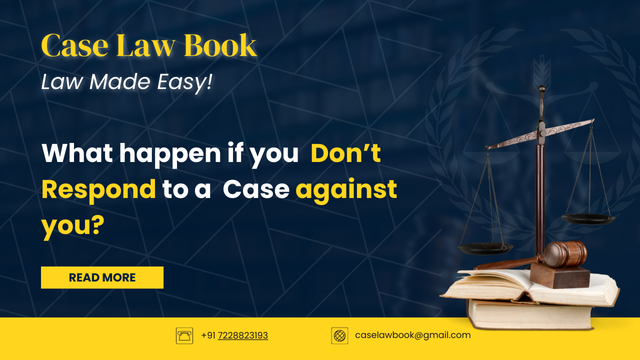Being served with a lawsuit in India can be a stressful and confusing experience. It’s tempting to ignore the legal documents, hoping the situation will resolve itself. However, ignoring a lawsuit can lead to a Default Judgment or ex-parte, a serious legal consequence. This article, written from a legal perspective, explains what a Default Judgment is within the Indian legal context, how it occurs, and, most importantly, how to avoid it. Our aim is to demystify this legal concept and empower you with knowledge of the Indian legal system.

The Foundation of a Lawsuit in India: Complaint, Summons, and Response (Code of Civil Procedure, 1908)
Understanding Default Judgment requires understanding the basic steps of a civil lawsuit in India, primarily governed by the Code of Civil Procedure, 1908 (CPC):
- Complaint/Plaint (Order VII, CPC): A civil suit commences with the plaintiff filing a plaint (a formal written complaint) in the appropriate court. The plaint outlines the plaintiff’s claims against the defendant and the relief sought. For instance, if someone claims you breached a contract, the plaint will detail the terms of the contract and how you allegedly breached it.
- Summons/Notice (Order V, CPC): Upon filing the plaint, the court issues a summons or notice to the defendant. This is the official legal notification that a lawsuit has been filed. The summons specifies the court, the case number, and a crucial deadline for the defendant to respond. This deadline is paramount to avoid a Default Judgment. The CPC outlines specific procedures for serving the summons to ensure the defendant receives proper notice.
- Written Statement/Reply (Order VIII, CPC): The defendant’s formal response to the plaint is called a Written Statement or Reply. This document allows the defendant to present their defense, deny the plaintiff’s claims, and raise any legal objections. Failing to file a Written Statement within the prescribed time (usually 30 days, extendable to 90 with court permission) significantly increases the risk of a Default Judgment.
What Exactly is a Default Judgment in India? (Order IX, CPC)
A Default Judgment in India, as governed by Order IX of the CPC, is a court ruling in favor of the plaintiff because the defendant has failed to appear in court or file the required Written Statement within the stipulated time. In essence, by not participating in the legal process, the defendant is considered to have defaulted, leading the court to rule against them.
The Process Leading to a Default Judgment in India:
The typical sequence of events leading to a Default Judgment in India is:
- Valid Service of Summons (Order V, CPC): The plaintiff must prove to the court that the defendant was properly served with the summons according to the CPC’s rules. This is essential for the validity of a Default Judgment.
- Defendant’s Failure to Respond (Order VIII, CPC): If the defendant fails to file a Written Statement or appear in court by the deadline stipulated in the summons, the plaintiff can apply to the court for a Default Judgment.
- Court Issues Default Judgment (Order IX, CPC): Upon the plaintiff’s application and proof of proper service, the court will issue a Default Judgment against the defendant. This grants the plaintiff the relief sought in the plaint.
Example: Suppose Mr. A files a suit against Ms. B for recovery of ₹1,00,000, claiming it’s an unpaid loan. Ms. B receives the summons but, thinking the claim is unjustified, ignores it. If Ms. B doesn’t file a Written Statement or appear in court, Mr. A can obtain a Default Judgment ordering Ms. B to pay ₹1,00,000.
Consequences of a Default Judgment in India:
A Default Judgment in India can have serious consequences:
- Financial Liability: The judgment will likely order the defendant to pay the full amount claimed, plus court costs and potentially interest.
- Enforcement of the Judgment (Order XXI, CPC): The plaintiff can execute the Default Judgment through various means, including attachment and sale of the defendant’s property, attachment of bank accounts, or arrest and detention in civil prison (in certain circumstances).
- Impact on Creditworthiness: While India doesn’t have a centralized credit scoring system as in some other countries, a Default Judgment can still negatively affect a person’s financial reputation and ability to obtain loans or credit.
Avoiding a Default Judgment: Essential Steps:
To avoid a Default Judgment in India:
- Seek Legal Advice Immediately: Consult a lawyer as soon as you receive a summons. They can assess the case, advise you on your options, and represent you in court.
- File a Timely Written Statement (Order VIII, CPC): Your lawyer will help you draft and file a Written Statement presenting your defense within the prescribed timeframe.
- Ensure Court Attendance (Order IX, CPC): Attend all scheduled court hearings, either personally or through your lawyer.
Setting Aside a Default Judgment (Order IX, Rule 13, CPC):
If a Default Judgment has been passed against you, you can apply to the court under Order IX, Rule 13 of the CPC to have it set aside. You must demonstrate “sufficient cause” for your non-appearance or failure to file a Written Statement.
Conclusion: Prompt Action is Crucial to Avoid Default Judgment in India
A Default Judgment is a serious legal issue with significant consequences. The best way to avoid it is to act promptly upon receiving a lawsuit. Consulting a lawyer and filing a timely response are crucial to protecting your rights. Ignoring a lawsuit will only lead to a Default Judgment and potentially much worse repercussions.
Want to learn more about Indian law in simple, easy-to-understand language? Explore our Case Law Book blog for articles and explanations that demystify complex legal concepts and answer your legal questions. We cover a wide range of topics to help everyone understand their rights and the legal system.
Note:
- This blog post is for informational purposes only and does not constitute legal advice.
- The specific laws and regulations may vary and are subject to change.
- It is always recommended to consult with a legal professional for personalized guidance on any legal matter.
- The examples provided are illustrative and may not reflect actual case scenarios.
Disclaimer: This blog post is for informational purposes only and should not be considered legal advice. If you are facing a legal issue, consult with a qualified attorney.
Also Check : How to File a Defamation Case Against a False FIR in India
